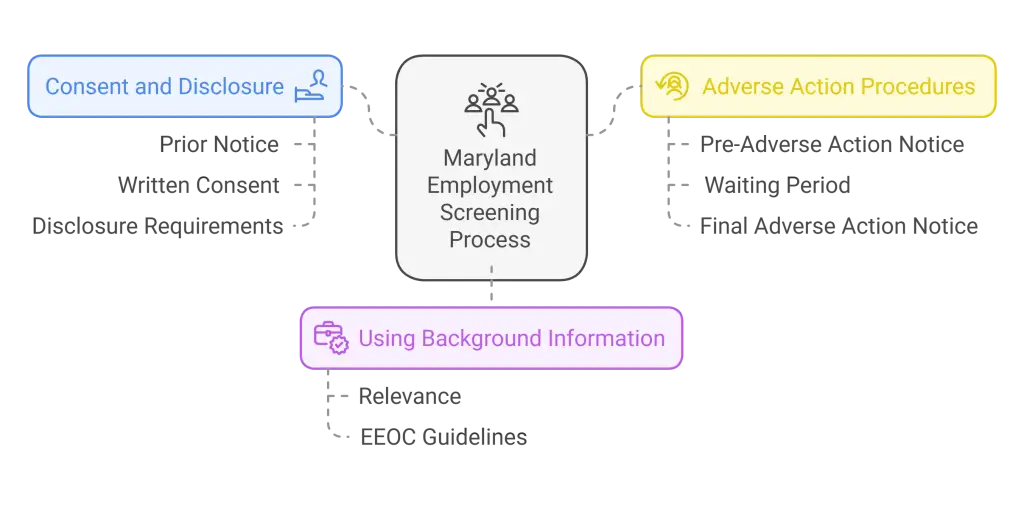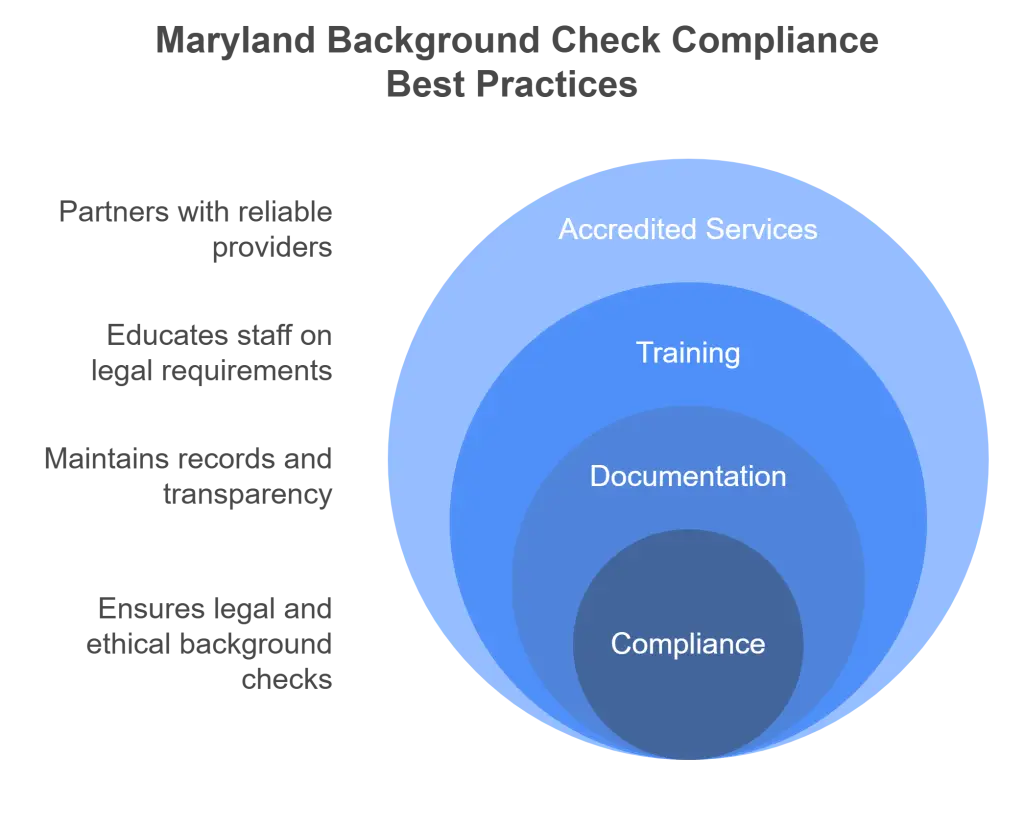Running background checks is a critical part of the hiring process. For employers in Maryland, it's imperative to understand the specific legal requirements to ensure compliance and mitigate legal risks. This guide will cover key aspects of Maryland background check laws, providing valuable insights for business owners, HR professionals, recruiters, and job seekers across various industries.
Key Takeaways
- Background checks are essential for ensuring a safe and productive workplace, particularly in specific industries like healthcare, transportation, and retail.
- Maryland's background check laws require employers to obtain written consent from candidates and adhere to strict disclosure and adverse action procedures.
- Employers must ensure that background information collected is relevant to the job and consistent with business necessity while complying with EEOC guidelines to prevent discrimination.
- Best practices for compliance include developing clear policies, maintaining thorough documentation, providing ongoing training, and using accredited background check service providers.
- Each industry, from staffing agencies to hospitality, faces unique challenges and requires tailored approaches to background checks to remain compliant with Maryland's legal standards.
Introduction
Background checks play a crucial role in maintaining a safe and productive workplace. By verifying the history of potential employees, employers can ensure they are hiring trustworthy and qualified individuals. For businesses operating in Maryland, understanding the state's unique background check requirements isn't just good practice—it's essential for compliance and legal protection.
This guide is specifically designed for business owners, HR professionals, recruiters, and job seekers in various sectors, such as Staffing Agencies, Healthcare, Transportation, Tenant Screening, Nonprofits, Retail, Technology, and Hospitality. Each industry has unique requirements and challenges regarding background checks.
In this comprehensive guide, we'll delve into Maryland's background check laws, breaking down the legal requirements, best practices for compliance, and sector-specific regulations. Whether you're a seasoned HR professional or new to the hiring process, this resource will provide the tools you need to navigate Maryland's background check landscape effectively.
EXPERT INSIGHT: When communicating with employees and candidates, the core values of transparency, honesty, and respect are paramount. This principle is especially crucial when conducting background checks. These three behaviors form the foundation of the entire background check process and its requirements. While these practices are considered best in some states, in Maryland, they are mandated by law as prerequisites. This article outlines these legal requirements and is an essential read for both new and seasoned practitioners with offices operating in Maryland. The insights can also be valuable in other regions, providing a robust framework for building trust and rapport with candidates. - Emile Garcia, SHRM-SCP, CHRP, CHRBP
Understanding Maryland Background Check Laws
Maryland Employment Screening
Employment screening investigates an individual's background and qualifications to verify their suitability for a particular job. This includes checking criminal history, credit reports, education and employment verification, and sometimes drug testing.
Conducting employment screenings is crucial for employers to make informed hiring decisions, protect company assets, and ensure a safe working environment. A thorough background check helps identify potential risks associated with hiring a candidate with a questionable past.
Maryland’s background check laws have specific provisions that employers must be aware of. These include restrictions on when and how criminal history can be inquired about and particular sector-specific regulations that surpass federal guidelines. Understanding the nuances of these laws helps employers navigate legal complexities and avoid potential litigation.
Additional Research: In Maryland, employers must follow specific procedures for conducting background checks, including the use of fingerprinting and the NGI Rap Back Service. The DPSCS provides detailed information on these requirements. This resource from the Maryland Department of Public Safety & Correctional Services (DPSCS) outlines the procedures and requirements for conducting background checks in Maryland. See DPSCS - Background Check.
Legal Requirements for Employers in Maryland
Navigating the legal landscape of background checks in Maryland requires employers to adhere to specific protocols designed to protect candidate rights and ensure fair hiring practices. Here’s a breakdown of what you need to know.

Consent and Disclosure
First things first: Consent and disclosure are non-negotiable. Before diving into a candidate's background, you must inform them and obtain written consent. This isn’t just a courtesy—it's the law. Here's how it breaks down:
- Prior Notice: You can't just spring a background check on a candidate. Inform them upfront, ideally during the application process.
- Written Consent: Get it in writing. Whether it's a simple form or an email agreement, written consent is key to compliance.
- Disclosure Requirements: Transparency is critical. You must tell candidates what will be checked and how the information will be used.
Using Background Information
Once you have the green light from your candidate, the next step is to ensure that the background information you gather is used appropriately. Here’s what that involves:
- Relevance: The information must be job-related and consistent with business necessity. If you’re hiring a driver, checking their driving record makes sense. For an accountant, maybe not so much.
- EEOC Guidelines: The Equal Employment Opportunity Commission has clear guidelines to prevent discrimination. Stay compliant by making sure your checks are consistent and non-discriminatory. For more details, check out the EEOC’s insights on background checks here.
Adverse Action Procedures
The final hurdle? Handling adverse actions correctly. If you decide not to hire someone based on their background check results, you have steps to follow:
- Pre-Adverse Action Notice: Send the candidate a notice before making final decisions. This lets them know you're considering adverse action based on their background check.
- Waiting Period: Give the candidate reasonable time to review the report and dispute any inaccuracies. The waiting period is usually about five business days.
- Final Adverse Action Notice: If you still decide to proceed after the waiting period, send a final adverse action notice. This should include information on the background check agency and how the candidate can get a report copy.
Following these steps keeps you compliant with Maryland’s background check laws and fosters trust and transparency in the hiring process. Whether hiring for a high-stakes healthcare position or staffing a retail store, clear communication and adherence to legal guidelines are non-negotiable.
Best Practices for Compliance

Documentation
Policy Development
Develop clear, concise background check policies. Ensure these policies outline the checks' scope, purpose, and legal basis. It's crucial to spell out which positions require background checks and what elements (such as criminal history, credit reports, etc.) will be reviewed. This transparency protects the company and keeps applicants informed.
Record Keeping
Maintain thorough documentation of all background checks and related processes. This includes storing consent forms, completed check records, and adverse action notices. Proper record-keeping ensures legal compliance and provides a paper trail should any disputes arise. Keeping organized records can be a lifesaver in audits or legal challenges.
Training
HR and Recruitment Training
Train your HR personnel and recruiters about Maryland's background check laws and compliance requirements. This might include workshops, online courses, or seminars. Proper training ensures your team understands their legal obligations and helps avoid unintentional violations.
Continuing Education
The legal landscape is constantly evolving. Schedule regular updates and training sessions to keep staff informed about changes in laws and regulations. Ongoing education ensures your team stays current and compliant, reducing the risk of costly legal missteps.
Utilizing Accredited Services
Partner with accredited background check service providers. Accredited agencies adhere to industry standards and are more likely to provide accurate, lawful background checks. This reduces the risk of errors that could lead to non-compliance. The Professional Background Screening Association is a valuable resource for finding accredited service providers.
Remain vigilant and proactive in your approach to background checks. By implementing clear policies, ensuring thorough documentation, providing necessary training, and using accredited service providers, employers in Maryland can maintain compliance and foster a safe, trustworthy workplace.

How Far Back Does a Background Check Go in Maryland?
Background checks in Maryland generally have a look-back period of seven years. Certain sensitive positions may require a longer look-back.
How Long Does a Background Check Take in Maryland?
Typically, a background check in Maryland takes three to five business days to complete. The process might take longer depending on the depth of the check.
Maryland Legal Requirements in Practice
When diving into compliance for background checks, different industries face unique challenges and standards. Here's a look at how Maryland's legal landscape plays out across various sectors:
Staffing Agencies
Frequent Turnover: Staffing agencies often contend with a high turnover rate. Rapid hiring cycles necessitate swift yet thoroughly compliant background checks. A streamlined, reliable screening process can help meet these demands while adhering to the law.
Diverse Client Needs: Agencies must navigate varying client requirements, adapting their background check processes accordingly without compromising legal compliance. Flexibility is key here, but it must be grounded in a firm understanding of Maryland’s regulations.
Healthcare
Patient Safety: The stakes are particularly high in healthcare. Thorough background checks are crucial for safeguarding patients, especially vulnerable populations such as the elderly and children. This typically involves detailed scrutiny of criminal histories and professional licenses.
Regulatory Compliance: Healthcare employers must juggle compliance with Maryland's general laws and sector-specific regulations. Keeping abreast of updates from bodies like the Maryland Department of Health ensures adherence to additional standards.
Transportation
Safety and Security: Background checks in the transportation sector must focus on driving records, drug testing results, and criminal history. Ensuring drivers and other personnel meet these checks maintains safety and security, which is a top priority given the direct impact on public safety.
Tenant Screening
Landlord-Tenant Laws: Landlords must follow strict compliance procedures to ensure that their background checks align with state and federal tenant screening laws. This includes observing protocols concerning what can and cannot be considered when evaluating a prospective tenant’s application.
Non-profit Organizations
Volunteer Checks: Screening volunteers can be as crucial as screening paid employees, especially for roles involving vulnerable groups or sensitive information. Non-profits need robust processes to verify the backgrounds of their volunteers, balancing due diligence with the spirit of volunteerism.
Retail
Employee Theft Prevention: In retail, background checks can help mitigate the risk of internal theft and fraud. Retail employers should emphasize prevention strategies through comprehensive background screenings, and identifying potential red flags in a candidate’s history.
Technology
Data Security: Given the nature of tech jobs, where employees often handle sensitive data, background checks must ensure candidates meet high standards of honesty and integrity. This sector may focus on verifying a candidate’s previous employment and education to ensure data security.
Hospitality
Customer Interaction: The hospitality industry relies heavily on customer trust and satisfaction. Ensuring that employees are trustworthy and reliable is paramount. Background checks often focus on criminal history and work reliability to maintain a safe and welcoming customer environment.
Each sector must adapt its background check approaches to meet legal standards while addressing unique industry needs. Staying informed and employing meticulous procedures can help employers remain compliant and make sound hiring decisions.
Maryland Background Check Resources
| Website Name | URL | Description |
|---|---|---|
| Department of Labor (Maryland) | https://www.dllr.state.md.us | Offers resources on labor laws, licensing, and regulations impacting employment and background checks. |
| Judiciary Case Search (Maryland) | http://casesearch.courts.state.md.us/casesearch/ | Tool to search for public court records, useful for thorough background checks. |
| Department of Public Safety and Correctional Services (Maryland) | https://www.dpscs.state.md.us | Provides information on criminal records, sex offender registry, and public safety concerns. |
| Attorney General’s Office (Maryland) | http://www.marylandattorneygeneral.gov | Offers guidance on legal matters, including consumer protection and employment law. |
| Department of Commerce (Maryland) | https://commerce.maryland.gov | Provides resources for business development and compliance with state regulations. |
| Business Express (Maryland) | https://businessexpress.maryland.gov | Comprehensive resource for business owners, offering information on licenses, permits, and legal requirements. |
| State Archives (Maryland) | https://msa.maryland.gov | Access to public records and historical documents for in-depth background research. |
| Department of Information Technology (Maryland) | https://doit.maryland.gov | Information on state IT policies and data privacy for handling sensitive background check information. |
| General Assembly (Maryland) | http://mgaleg.maryland.gov | Updates on laws and regulations passed by the state legislature affecting background check procedures. |
| Department of Health (Maryland) | https://health.maryland.gov | Information on health regulations and requirements impacting employee screenings and background checks. |
Frequently Asked Questions (FAQ)
Can employers run a background check without consent in Maryland?
No, employers in Maryland cannot legally run a background check without first obtaining written consent from the applicant. This aligns with the Fair Credit Reporting Act (FCRA) and Maryland-specific laws, emphasizing the importance of candidate privacy and informed consent.
What information is typically included in a Maryland employment background check?
A standard employment background check in Maryland might include criminal history, employment verification, educational background, credit history (where relevant), and professional license verifications. The specifics can vary based on the industry and the job requirements.
How long does it take to complete a background check in Maryland?
The duration can vary, but most employment background checks in Maryland take a few days to a week. Factors influencing this include the complexity of the check, the responsiveness of past employers or educational institutions, and the thoroughness of the checking service used.
Can a candidate dispute the results of a background check?
Yes, candidates have the right to dispute the results of a background check. Candidates can contact the background check agency to dispute the findings if there are inaccuracies or errors. Employers must allow time for this process before making a final employment decision.
What happens if an employer violates Maryland background check laws?
Employers violating Maryland background check laws can face significant legal consequences, including fines and lawsuits. Non-compliance can damage an employer's reputation and undermine trust with current and potential employees. Ensuring strict adherence to state and federal regulations is crucial to avoid these ramifications.
Conclusion
Understanding and adhering to Maryland's background check laws is crucial for any employer. From securing written consent to navigating the nuances of "Ban the Box" legislation, it's clear that a rigorous, compliant screening process is non-negotiable. By keeping these regulations top of mind, employers safeguard their businesses from legal ramifications and foster a fair and secure hiring environment.
Employers should view these legal requirements not as hurdles but as integral steps toward building a trustworthy and effective workforce. Every compliant background check puts you closer to ensuring your team is capable and reliable.
Stay vigilant, stay informed, and remember that a thorough background screening process is an investment in your company's long-term success. Compliance is more than a box to tick—it's a commitment to excellence and integrity in every hire.
Additional Resources
- How Automation is Transforming Employee Screening
- Overcoming Common Screening Challenges
- Michigan Background Check Laws: A Guide for Businesses and HR
- Maryland Background Check Laws: What Employers Need to Know
- Integrating Background Checks into the Onboarding Process
- The Benefits of Post-Employment Screening for Employers
- Everything You Need to Know About Form I-9
- The Importance of Background Checks for Church Staff and Volunteers
- In-house Background Screening vs Outsourced Background Screening
- How To Move To A New Background Screening Provider
- Do Warrants Show Up on Your Background Check?
- Rideshare Driver Background Checks: What You Need to Know
- Understanding the Right to Work Share Code: Everything You Need to Know
- Commercial Transportation Fraud Prevention
- Comprehensive Guide to Background Checks in New Mexico
- Pennsylvania Background Check Laws: Your Complete 2024 Guide
- Massachusetts Background Check Laws: A Comprehensive Guide
- How to Dispute Public Records in Alaska: A Step-by-Step Guide
- Top Conferences for the Background Check Industry
- The Role of Background Checks in Preventing Workplace Violence

GCheck Editorial Team
Meet the GCheck Editorial Team, your trusted source for insightful and up-to-date information in the world of employment background checks. Committed to delivering the latest trends, best practices, and industry insights, our team is dedicated to keeping you informed.
With a passion for ensuring accuracy, compliance, and efficiency in background screening, we are your go-to experts in the field. Stay tuned for our comprehensive articles, guides, and analysis, designed to empower businesses and individuals with the knowledge they need to make informed decisions.
At GCheck, we're here to guide you through the complexities of background checks, every step of the way.






